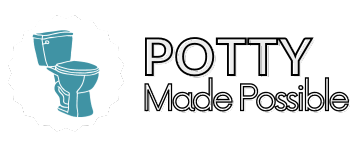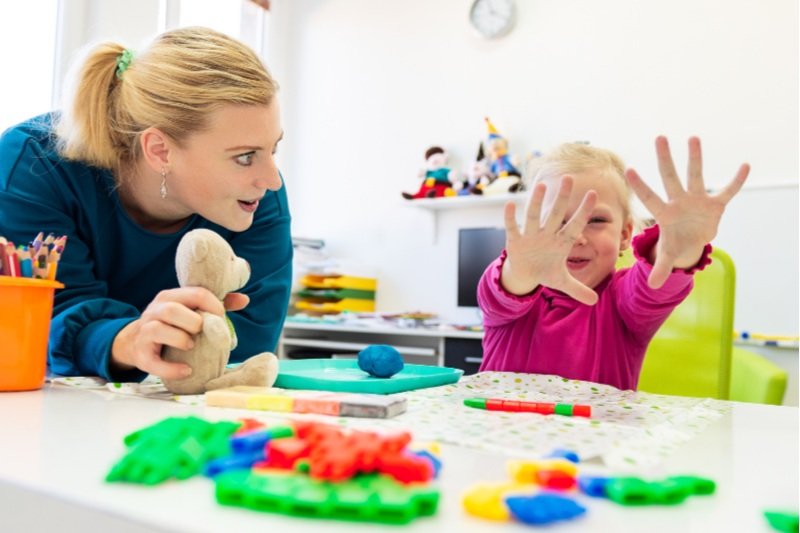Potty Training Tips from the Experts
We’ve teamed up with All About Speech & Language to share some great Potty Training Tips from:
Speech-Language Pathologists (SLP)
Occupational Therapists (OT)
Board Certified Behavior Analysts (BCBA)
“ Coming together is a beginning. Keeping together is progress. Working together is success!”
Show Your Child What to Expect with Books!
Potty training can be an exciting journey for your child, and one way to make it more engaging is through books.
Start by incorporating potty training-themed books into your daily routine. Whether you choose playful and animated stories or more straightforward guides, these books can help familiarize your child with the concept of using the potty and make it more relatable. Select a book that matches your family’s potty-training style.
Some examples of books are “P is for Potty” by Naomi Kleinberg and Chrisopher Moroney, “Pottysaurus” by Little Hippo Books, and “Everybody Potties” by Cheri Vogel.
Utilize the Power of Visual Tools!
Visual aids can be a game-changer when it comes to potty training.
Introduce your child to a social story that outlines the potty-training process, breaking it down into simple steps.
You can take photos of your own bathroom so that your child can visualize what the potty process will be in their own home. By walking through the story together and using a visual schedule, you can provide your child with a clear and visual representation of the routine.
This approach helps them understand what to expect & boosts confidence throughout the process.
Sing, Rhyme, and Celebrate Potty Success!
When it comes to communicating about potty training, simplicity and fun are key.
Use functional and simple wording, incorporating catchy phrases and singing songs to make the experience more enjoyable for your child. Catchy phrases and songs can create a positive association with using the potty and motivate your child.
An example of a song to sing is “When You Have to Go Potty, Stop and Go Right Away” from Daniel Tiger’s Neighborhood!
Additionally, consider implementing a reward system, where a positive prize awaits their achievements, to further encourage their progress.
Expert #2: Potty Tips from an Occupational Therapist (OT)
Drink Up for Potty Success!
Drinking plenty of water or liquids is an essential aspect of potty training.
Encourage your child to stay hydrated throughout the day by offering them frequent sips of water or other suitable beverages.
By drinking an ample amount of fluids, their body will naturally produce urine, creating opportunities for them to practice using the potty.
Additionally, consuming fluids helps regulate their digestive system, promoting regular bowel movements, which is an important part of the potty-training process.
Discerning the Difference Between 'Wet' and 'Dry'
Engaging in play activities that involve discerning between things that are "wet" and "dry" can be a valuable way to help your child understand bodily sensations and connect them to the concept of using the potty.
Encourage sensory play experiences where they can explore and identify items or materials that are wet, such as water play, painting, or using wet wipes. Likewise, introduce activities that highlight dry objects, such as playing with dry sand or sorting dry items.
By actively participating in these experiences, your child can develop a better understanding of the feelings associated with wetness and dryness, helping them to recognize when they need to use the potty.
Avoid Lengthy Toilet Sits for Positive Potty Training
When it comes to potty training, it's important not to make kids sit on the toilet for extended periods of time. Toilet sits can be short and sweet, lasting around 2 to 5 minutes at most. Prolonged sitting may create negative associations with the bathroom and potentially lead to resistance or anxiety about using the toilet. Instead, when your child sits on the potty, offer reassurance and support during their time on the toilet. If they don't produce any results within the time frame, reassure them and allow them to try again later. Remember, the goal is to make potty training a positive experience, and avoiding long sitting sessions helps maintain a favorable environment for your child's learning and progress.
Create a Positive & Enjoyable Environment
Have your child participate in gathering supplies, books, toys, and decorations for their bathroom. The idea is to create a fun space that they want to be in!
Let them pick out a few special toys that will stay in the bathroom, alongside a few potty books that they can look at while they sit on the potty. You can let them put clings or stickers on the bathroom mirror or toilet itself, too.
It’s also helpful to have lots of options for your child in this space - choices give our kids more control throughout this process.
Examples of options you can give: toilet AND little potty, different styles of undies, toilet paper OR wipes.
Tap Into Their Motivation
For starters, check out our Using Rewards Vs. Praise blog !
Learning to use the potty is a big, challenging skill, and, let's face it, most kids are quite comfortable with or even attached to their diapers.
Providing a reward can really spark their interest and solidify their new skills - you just need to find out what works for them! This could be anything from praise and high 5s, a dance party, a pillow fight, to a small edible treat or a tiny toy.
Hone in on the behavior you want to increase (such as practicing sitting, peeing or pooping in the potty) and deliver the reward following that success so that that behavior will increase in the future.
We recommend picking a reward that they don't have frequent access to outside of potty training for the best results!
Be Consistent with Your Approach
Our kids thrive off routines and consistency - potty training should be no different! Regarding the method you chose, as well as the routines that you implement in the weeks that follow, it's important to have a plan and stick to it.
Select a method that aligns with your child's skills and strengths as well as YOUR parenting preferences.
It may take time to achieve your ultimate potty goal, but that doesn't mean your plan isn't effective. Starting and stopping over and over again or changing the "rules" can be confusing for our little ones. On the other hand, if you've put a solid several days in and things just aren't clicking, that could be a good time to reach out to the professionals for some guidance.
We’re here to help you feel confident & prepared to potty train your little one!!
Check out your support options here!
Looking for speech therapy, occupational therapy, social skills, or reading & writing services for your child?
Talk to our friends over at All About Speech& Language!!
(Located in Brandon, FL & Tampa, FL. Teletherapy services available, too.)




